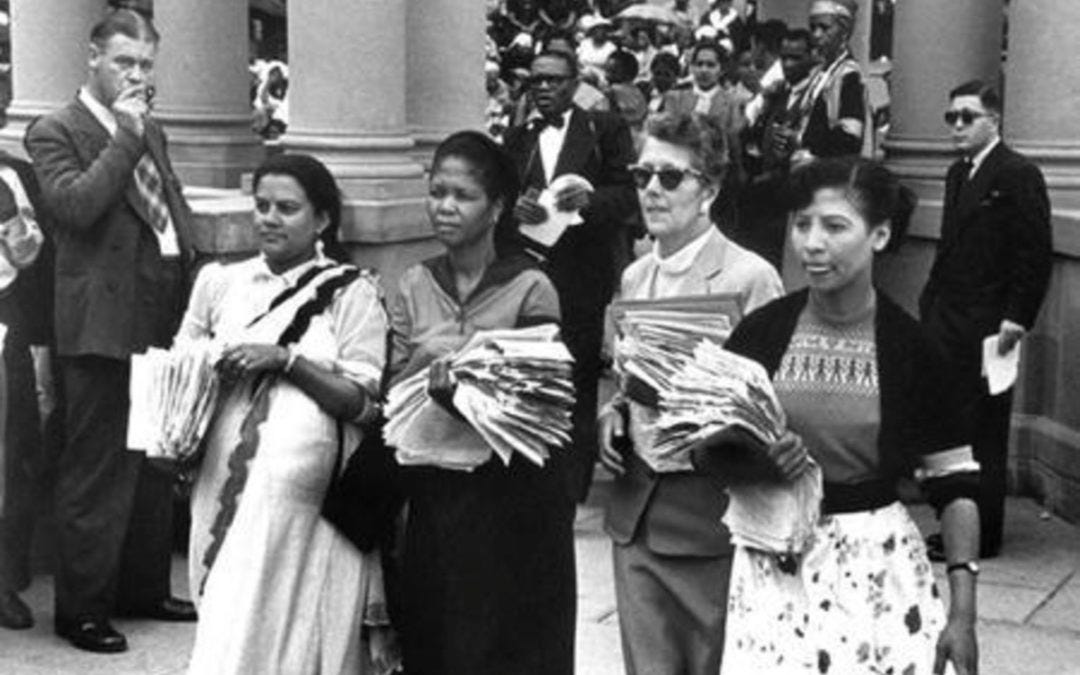1956 Women's march: A vision of Equality
Reflecting on the courage and legacy of South African women.
Leading women in 1956 march: Rahima Moosa, Lilian Ngoyi, Helen Joseph, Sophia de Bruyn
"With this image, I tell them It was not Helen Joseph in the front Rahima Moosa was not behind her nor in front of Sophie de Bruyn No, Mama Lilian Ngoyi was not behind these women. Look, my children, they stood side by side. Look again. It is not Helen Joseph standing on top of Rahima Moosa or Sophia de Bruyn Nor all of them standing on the back of Mama Lilian Ngoyi! Look closely my children, they stood side by side as equals. This image is the inspiration of the clause in the world-acclaimed constitution that would make women of South Africa equals! Koko kgalema ka bogale kgatello ya basadi ba thari entsho You are the women who stood side by side, women whose thumbs were raised high, fighting for the emancipation of women, the emancipation of African women, lona boKoko ba ba re tsalang No regrets! Why this regression! Why this status quo! Why this inequality! Strydom and Verwoerd are no more. Passopang julle oppressors of African women Maila-kgaka-manwa-moro!" A Poem by Mme Boitumelo Mofokeng (2020) In her poignant poem, Mme Boitumelo Mofokeng captures the essence of equality and strength. This poem is featured in the coffee table book Kauve! The Women's March of 1956 to Pretoria 64th Anniversary, compiled and edited by Mofokeng, Mothobi Mutloatse, and Athambile Masola (Skotaville, 2020).
Why should we remember and what about today?
Women's Day in South Africa is a public holiday celebrated annually on 9 August to remember the events of the 1956 march. On this day, about 20,000 women marched to the Union Buildings in Pretoria to stand up against systemic laws of oppression and violence during apartheid.
As women of faith, the Bible gives us examples of courageous women who were on God's side and stood up for what is right. Take the story of the five daughters of Zelophehad, as an example. These women stood together and spoke to Moses about changing the rights of inheritance. While not all of them may have spoken up at the meeting, they were all present. They were equal in wisdom and bold in pursuing righteousness. We see them even named in the Bible a few times: Mahlah, Noa, Hoglah, Milcah, and Tirzah (Numbers 27 & 36; Joshua 17). They advocated for women's rights to inherit land, and God answered their petition.
Today, South African women face significant challenges, with gender-based violence being one of the most pressing issues. South Africa remains one of the most unequal in the world, with women bearing the brunt of this inequality, made worse by high unemployment. This heartbreaking story of a young mother, Bongeka Buso, from the Eastern Cape was in the news just last August. It’s so tempting to disengage or try and avoid it (I sometimes don’t even want to listen to the news anymore). But even in the face of these daunting challenges, I find hope and strength in the small ways that women share their power. I've seen firsthand how women can help each other unlock potential towards meaningful change in their lives.
I often think, how can women, in small groups of three or five, make a difference? Just like the daughters of Zelophehad, we can stand together and advocate for change. I wonder if the key to the success of the daughters of Zelophehad is that they remained present. They didn't just send in the oldest or the more talkative one to speak on their behalf; they were in it together. I resonate so much with the poem that “Helen Joseph wasn't leading the way, nor were they all standing on the back of Lilian Ngoyi – they stood side by side as equals”.
What does being equal look like when we support one another as women? Maybe for now, it looks like being present for each other, truly listening and valuing each other's voices. Perhaps genuine listening is the gift and by paying attention, I am willing to pay the cost for another’s freedom. Listening generously and acknowledging the person allows us to understand and empathize with one another's experiences, fostering a sense of equality and mutual respect.
When we practice generous listening, we validate each other’s struggles and triumphs, making everyone feel heard and valued. Being equal also means sharing opportunities and resources. It can look like mentoring young girls and women or helping a single-parent neighbour and offering guidance, support, and resources to help them achieve their goals and overcome challenges.
It can be overwhelming thinking about sharing when the challenges are so great. With all uncertainty in geopolitical conflicts and with the weak outlook of the economy, sharing of your self or your resources can be daunting but I believe that our small acts can have a significant impact. Let’s ask the Holy Spirit to guide us in how we can share power in our relationships at home, at work and in our communities.




